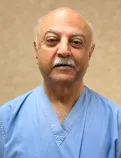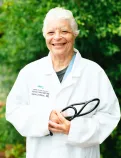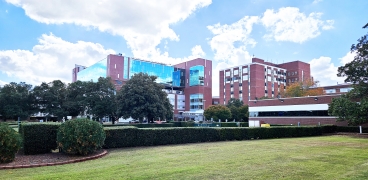If you have a lung nodule, or spot on your lung, the odds are that it’s nothing to worry about. However, some nodules can be signs of lung cancer — which is treatable if we catch it early.
Lung Nodule Diagnosis at Cape Fear Valley Health
Most lung nodules are too small to cause any symptoms. About 95% of them are benign (non-cancerous), and they are caused by past respiratory infections or other conditions.
Lung nodules are typically found in one of two ways.
- Lung cancer screening: If you’re a current or former smoker, talk to your primary care provider about lung cancer screening. Screening is fast and easy with a yearly low-dose CT scan. It can catch nodules very early, when lung cancer is most treatable.
- Incidental finding on an X-ray or CT scan: Many lung nodules are first discovered on chest X-rays or CT scans that are done for other issues. If the radiologist who reads your images sees a lung nodule, they’ll refer you to a pulmonologist for follow-up.
What to Expect If You Have a Lung Nodule
If your imaging shows a lung nodule, your provider will refer you to our lung nodule clinic. In the clinic, our lung nodule specialists will customize a plan for what comes next. Your care team will be with you every step of the way.
- At the lung nodule clinic, you’ll talk first with a dedicated nurse navigator. They’ll answer your questions, get your health history and schedule your consultation with one of our pulmonologists.
- Before your consultation, our team of pulmonologists will review your newest scan together and compare it to any previous scans. They all bring years of expertise to the discussion of how to proceed.
- At your appointment, your pulmonologist will explain your scan and talk with you about your treatment plan.
- Your plan might include follow-up scans at regular intervals or diagnostic testing such as a bronchoscopy.
- Our nurse navigator will coordinate your follow-up appointments. They’ll be your personal point of contact the whole time you’re our patient.
Lung Nodule Treatment at Cape Fear Valley Health
We manage most nodules with regular monitoring over time to see whether they change. Sometimes, we’ll recommend additional diagnostic tests.
If Your Nodule Needs to Be Monitored
You’ll have regular low-dose CT scans to track any changes in your nodule. Your team will customize your monitoring plan according to the nodule’s size and appearance:
- Small, solid nodules that are not likely to be cancerous may only need to be scanned every one to two years.
- Larger nodules or nodules that have characteristics like irregular borders may need more frequent scans.
If Your Nodule Needs Further Testing
If scans show that your lung nodule looks suspicious for cancer or is growing, your pulmonologist may recommend further tests.
These could include a positron emission tomography (PET) scan or a bronchoscopy with biopsy. A biopsy removes a small piece of tissue from the nodule so that it can be examined under a microscope.
You can also get annual low dose CT chest exams for lung screening if you meet the following criteria:
- 50-80 years old
- currently smoke or have smoked in the last 15 years
- have a 20 pack per year or more smoking history (number of packs of cigarettes smoked per day x number of years you smoked)
If Your Nodule is Cancerous
If your biopsy finds cancer cells, you may need surgery to remove the nodule and some surrounding tissue.
Cape Fear Valley Health lung cancer experts will join your care team. They might include:
- Thoracic surgeons
- Interventional radiologists
- Medical oncologists
- Radiation oncologists
Your cancer care team works with you to develop a treatment plan tailored to your unique needs and preferences.









